With an open rate of 98%, a delivery speed of five seconds, and messages typically opened within 90 seconds, it’s no wonder that SMS is a popular addition to a marketer’s toolkit.
We could talk about impressive SMS stats all day. However, you might now be wondering what it takes to successfully launch an SMS Marketing campaign. Keep reading to learn everything you need to know about SMS Marketing and the power of this remarkable communication tool.
What is SMS Marketing?
SMS: Short Messaging Service (commonly known as a text message).
SMS Marketing: The practice of sending marketing messages by text.
SMS is a popular communication channel, with 91% of customers saying they’d opt-in for texts from businesses. It’s a sure-fire way to create an instant, one-to-one connection with your customers. More personal than an email, you can take advantage of RCS and rich and conversational messaging to take your SMS to the next level.
In short, SMS Marketing is a communication channel that will get your business noticed and remembered.
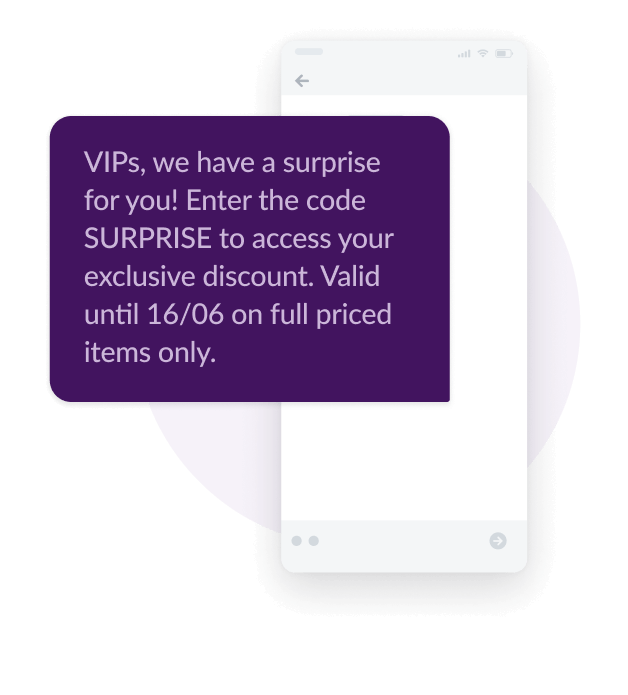
Is SMS Marketing still effective?
In a world where we check our mobile first, SMS can put your business straight into the hands of the customer. Whether it’s a sales message, a reminder, a rich mobile experience or a particular conversation you want to start.
Here are four key reasons why SMS Marketing is still effective and should be considered essential to your marketing mix.
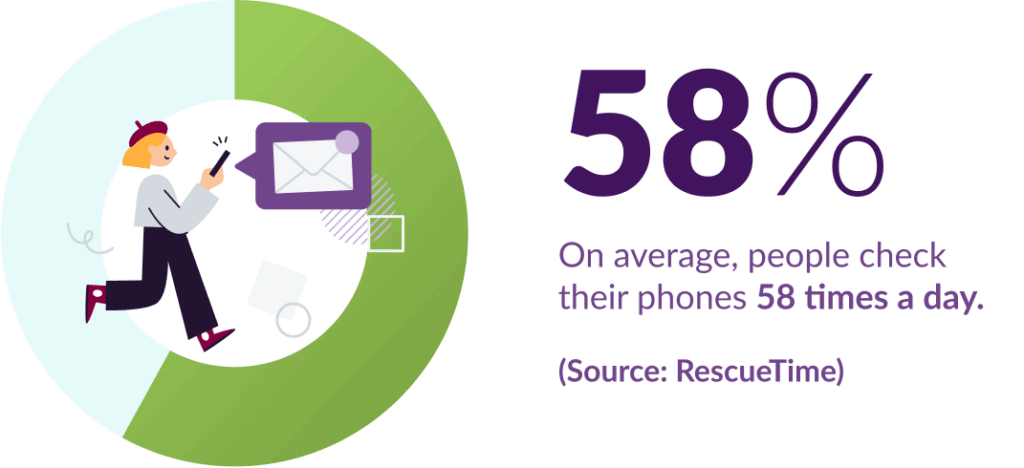
1. It’s mobile-friendly
Of all the reasons why businesses should move to a mobile-first strategy, the main reason is our reliance on our phones. Current research suggests that 48% of people are on their smartphone between four and eight hours a day, with seven in 10 of us checking any unread notifications in less than five minutes! It’s no surprise consumers actually expect to hear from businesses through text messaging.
2. It’s cost efficient
SMS is more effective than most traditional marketing methods. Not only are messages sent almost instantly, but they’re also highly likely to be read and acted upon, creating measurable, attributable and high ROI for marketers. Campaigns can be deployed simply; text messages require little need for extra design or content resources. Or they can be the driver to multi-media mobile experiences – whichever your business requires.
SMS is also targeted – unlike mass media, you’re contacting a unique and engaged audience. Better still, you only pay for the messages you want to send so there’s no complex subscription model required!

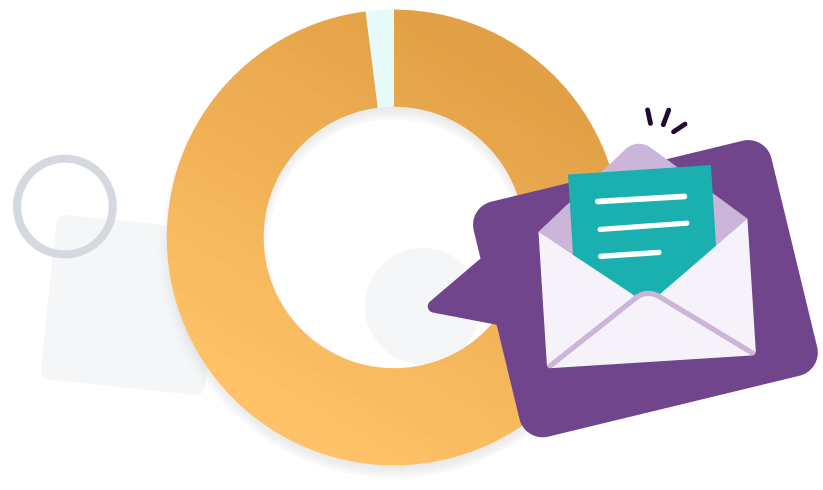
3. It complements other marketing strategies
SMS can be used on its own. But you’ll gain the best results when it’s used alongside existing marketing communications, such as social media, email, WhatsApp Business Platform, direct mail and search advertising. Each channel can work together to create a unified message and voice for your brand.
Also, the variety of touch points not only makes things more convenient for your customers but it places the power of choice back into their hands.
Learn More: SMS Vs Email Marketing: Which Should You Choose?
4. Boosts customer engagement
With an average open rate of 98%, a text message is 4 times more likely to be opened than an email. This opens up a fantastic opportunity to connect with your customers on a personal level.
With the right SMS solution, you can choose who you target and create personalised SMS campaigns that help build long-lasting relationships with customers.
Learn more: How to Personalise Your SMS Marketing Messages
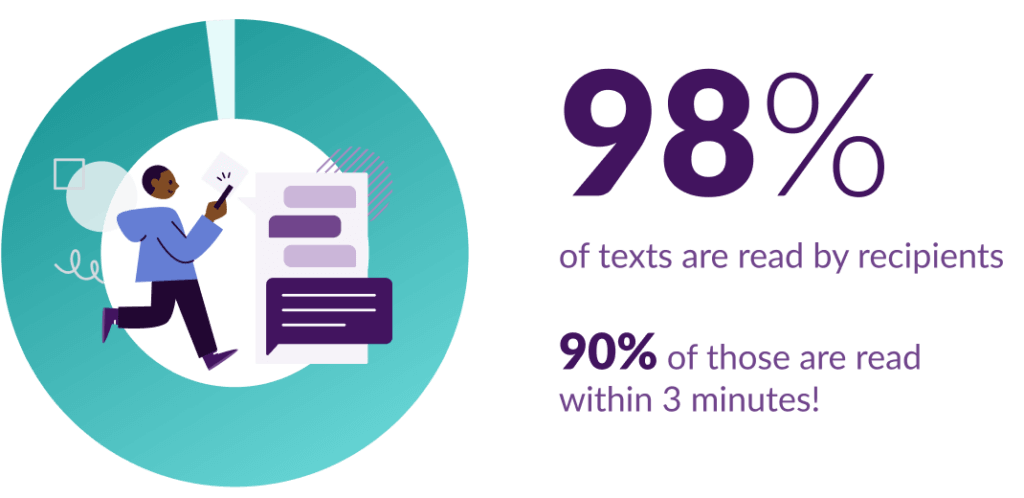
Whether you’re a small or large business, B2B or B2C, using SMS messaging as a marketing tool has many benefits. From allowing you to instantly reach customers, save resources, reduce your carbon footprint, and improve flexibility and efficiency, all while helping to build brand loyalty and trust. As a result, you will maximise your results and boost your ROI like never before.
Need some inspiration? Take a look at 9 real-life SMS Marketing campaigns to inspire you.

SMS Marketing regulations
Like other communication channels, there are some strict SMS regulations that businesses must understand before they send out their first text. For starters, customers must give you permission to contact them via SMS.
The laws around SMS Marketing will vary from country to country. In Australia, SMS Marketing is covered by data laws most marketers will already be familiar with, such as: ACMA regulations.
Learn More: SMS Compliance Australia
Examples and use cases of SMS Marketing
So now you understand the potential of SMS Marketing, the next step is understanding how and where to use it.
There are endless use cases for SMS Marketing depending on the specifics of your business and what you are looking to promote, or to communicate to your customers. Let’s start with 5 common ways that it can be used:
1. Welcome offers
Although 75% of customers want to receive offers via SMS, most businesses tend to only send a welcome email. If you offer a registration incentive, sending a discount code or link via text can ensure your offer is seen, and the consumer will likely go ahead and use that 10 or 20 percent discount.
Example:
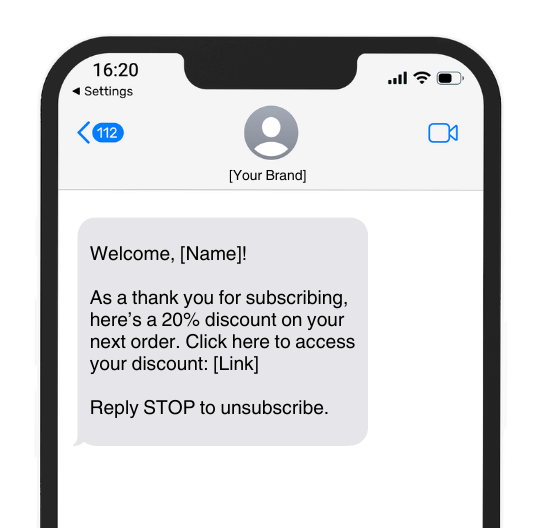
2. New products
Instantly share updates about your new and upcoming products with a simple yet effective SMS. Use the power of data to build customer trust by sending updates on the products your customers will truly care about.
Example:
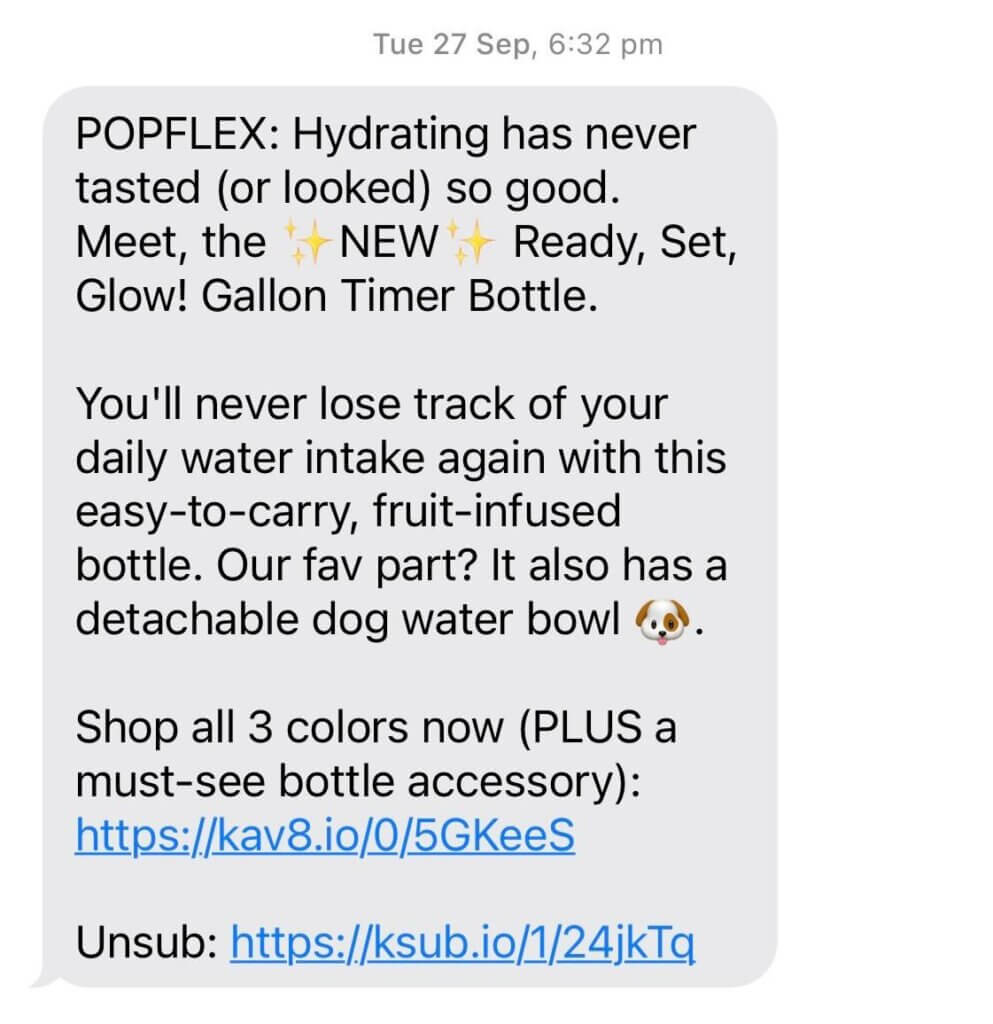
3. Surveys
SMS surveys are more likely to be seen because today’s consumers rely more on mobile devices than ever before. Surveys can also be sent out quickly to many people due to Bulk SMS, which is perfect for businesses that need to send automated messages in high volumes, such as those in finance, travel and retail.
Example:
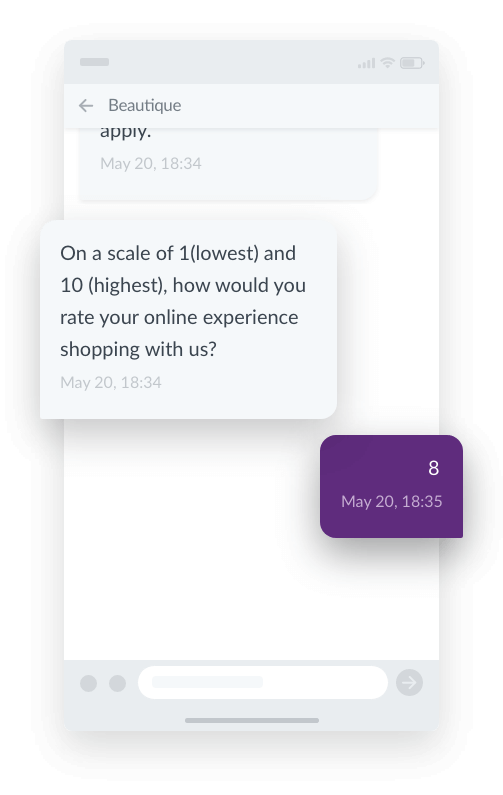
4. Personalised offers
Did you know 80% of consumers are more likely to buy from a company that provides a personalised experience? Adding a first name is one of the simplest ways to personalise, but think about what other relevant data you could use. Maybe you can send a discount code around a birthday or customer/business anniversary.
Example:
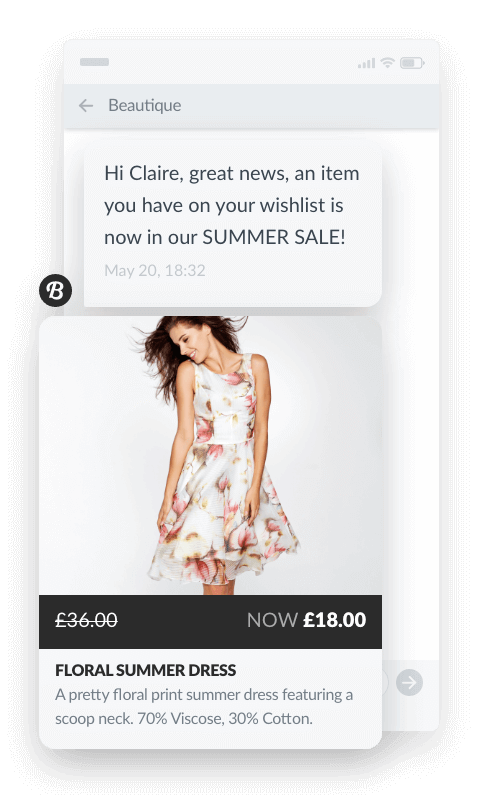
5. Reminders
Text message reminders help ensure customers never miss key events, from appointments to webinars and even in-person occasions. Use SMS to not only inform customers about events but also follow up with a reminder. This can help boost interest, engagement and attendance rates.
Learn more: SMS Appointment Reminders: How to Reduce No-Shows
Example:
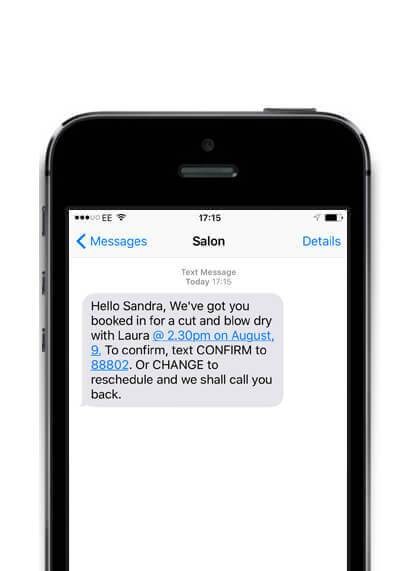
💡 SMS Marketing in action: World Recruitment used a two stage process to re-engage with lapsed customers and stimulate revenue.
SMS Marketing best practices
To harness the power of SMS Marketing, consider these five best practices.

1. Get permission
As mentioned above, you should only send text messages to those who have given you permission. You can gain consent through an opt-in process that clearly states that the data subject is consenting to receive messages from you. Want to learn how to increase your SMS opt-in rates? Check out this post.
There are many ways you can grow your SMS database, but providing a signup form that requires a specific action, such as ticking a checkbox, is a simple way people can opt-in. Along with this, you must provide a privacy policy so subscribers know exactly what they are signing up for.
2. Send content that adds value
There’s a lot to consider when planning an effective SMS campaign. You can boost ROI by following these key content tips:
- Offer valuable information rather than impersonal, ‘salesy’ messages.
- With a 160 character limit, you want your message to be concise but impactful.
- Try to avoid complex sentences and keep messages simple and easy to digest.
- Using abbreviations can be tempting but must be avoided to prevent confusing your customers.
- SMS is great for grabbing attention, so make sure your call to action is clear and compelling. Discover our ready-to-use message templates to help you get started.
- Don’t forget to track your CTA links for full campaign attribution and future optimisation.

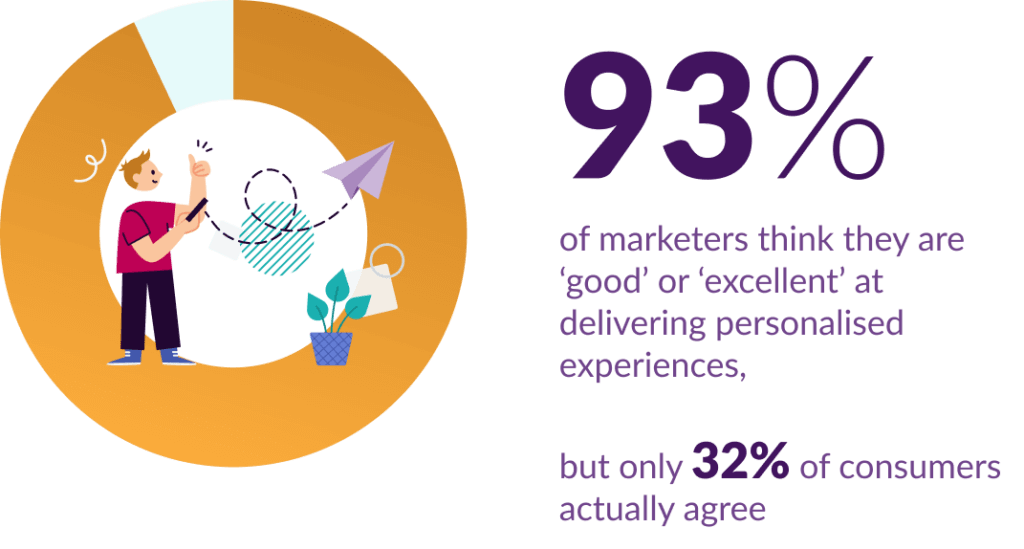
3. Get personal
Although 93% of marketers think they are ‘good’ or ‘excellent’ at delivering personalised experiences, only 32% of consumers agree. So, make sure you’re gathering, analysing and using the correct information to inform your customer communications, particularly as 80% of consumers are more likely to buy from a company that provides a tailored experience.
It can be as simple as calling customers by their first name or as elaborate as recommending products/services/articles based on purchase or search history. Whatever you decide to do, customer data can help you to target your messaging more precisely. This, in turn, allows businesses to build stronger customer relationships.
4. Timing is everything
Every marketer must consider the frequency and timing of sending text messages. Send at the wrong times or text too often, and you risk losing customers. So, when exactly is the best time to send an SMS?
Generally, sending between business hours, 9am-6pm, is safest, but evening and weekend sends can be highly impactful for retail, leisure and entertainment messages. We also recommend avoiding night time sends – only some people turn their phone off overnight, and waking your customer at 3am is the easiest way to lose a loyal customer!
Getting the timing right is also key to ensuring your text messages align with your other marketing communications. For example, email and SMS should work together to maximise customer engagement and help increase your conversion rate, brand awareness and business growth.


5. Always provide an opt-out
It’s now a legal requirement to offer customers a simple way to remove their consent to receiving marketing communications. For SMS Marketing, include an opt-out message in every text to remind customers they can unsubscribe anytime. Simply ask them to respond to messages using the word ‘STOP’ or ‘UNSUBSCRIBE’. Don’t forget to send your customers a follow-up text message confirming this.
How to automate SMS Marketing
Automating SMS Marketing can significantly enhance your lead nurturing efforts. Studies have shown that texting a prospect after the initial contact with your service can boost conversion rates by an impressive 112%.
One key aspect of automating SMS Marketing is the ability to manage subscriber lists effectively. By organising your contacts into subscriber lists based on keywords or actions, you can ensure that relevant messages are delivered to specific contacts at the right time. This targeted approach increases engagement and maximises the impact of your marketing campaigns.
Along with this, automated SMS Marketing is an excellent tool for informing valued customers about promotions and product launches. Through cross-channel campaigns, you can reach your audience with compelling messages, leveraging time or action-based drip messages. This strategy allows you to create anticipation and excitement, driving interest and sales for your offerings.
By harnessing the power of automated SMS Marketing, you can streamline your communication processes, nurture leads, and effectively promote your products or services to a highly targeted audience.
